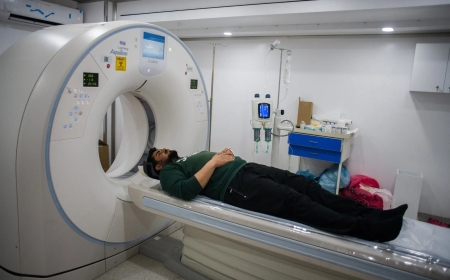Psoriatic arthritis
Advocare Arthritis Osteoporosis and Rheumatology Associates specializes in treating psoriatic arthritis, inflammatory arthritis, and autoimmune joint pain with expert arthritis specialists dedicated to personalized, compassionate care and advanced treatment.

Chronic joint pain is a health issue that many people try to brush off, attributing it to getting older or overexertion. However, when that pain is persistent, paired with swelling, stiffness, fatigue, or skin changes, it may signal something more serious than simple wear and tear. For individuals who have or have had psoriasis, a specific type of autoimmune arthritis might be the underlying cause.
Psoriatic arthritis is a condition that often catches people off guard. It doesn't always follow a predictable pattern and tends to affect each individual differently. Some may experience joint symptoms years before any skin involvement, while others may struggle with both simultaneously. Because of its subtle nature and overlap with other joint diseases, this condition is often underdiagnosed or misdiagnosed. Thats why early recognition and targeted care make a significant difference.
If you suspect you're dealing with more than just routine joint pain, consulting experienced arthritis specialists is a crucial next step. They are trained to identify the nuances of autoimmune conditions and can properly evaluate whether your symptoms align with Psoriatic arthritis or another form of inflammatory arthritis, ensuring accurate diagnosis and timely treatment.
What Psoriatic Arthritis Actually Is
Psoriatic arthritis is an autoimmune disease, which means it results from a faulty immune response that targets healthy tissuesspecifically, the joints and skin. This condition commonly affects individuals who already have psoriasis, but not always. It can cause inflammation in any part of the body, including the spine and fingers, and it doesnt discriminate based on age or gender.
It belongs to a broader family of conditions known as spondyloarthropathies and is classified under inflammatory types of arthritis. Unlike osteoarthritis, which results from joint wear over time, psoriatic arthritis is rooted in immune dysfunction. That immune activation leads to swelling, joint damage, and in some cases, irreversible erosion if left untreated.
Who Is at Risk?
Although the precise cause of psoriatic arthritis remains unknown, genetics and environmental triggers seem to play a strong role. People with a family history of psoriasis or autoimmune diseases are at higher risk. It commonly appears between the ages of 30 and 50 but can occur at any age.
In some cases, infections, injuries, or even emotional stress can act as triggers, initiating the onset of symptoms. The condition may start slowly, with mild stiffness or swelling, or come on more aggressively with severe inflammation and visible skin lesions. The wide range of symptoms and severity makes expert assessment essential for distinguishing psoriatic arthritis from other conditions like gout or rheumatoid arthritis.
Signs and Symptoms to Look Out For
While joint discomfort is a common early sign, psoriatic arthritis affects more than just mobility. Its impact can be widespread, sometimes involving the skin, nails, eyes, and spine. Some hallmark symptoms include:
-
Swelling in the fingers and toes (often called "sausage digits")
-
Joint stiffness, especially after periods of rest
-
Pain and tenderness in joints such as the knees, ankles, and lower back
-
Fatigue that doesnt improve with rest
-
Nail pitting, discoloration, or separation from the nail bed
-
Red, scaly skin patches characteristic of psoriasis
-
Eye inflammation in more severe cases
Because these symptoms can appear intermittently and range in intensity, many people delay seeking helponly to learn too late that joint damage has already occurred.
Importance of Timely Diagnosis
One of the most crucial aspects of managing psoriatic arthritis is early diagnosis. Once joint damage progresses, it cannot be reversed. Thats why paying attention to early warning signs and consulting the right professionals is so important.
Diagnosis typically involves a thorough physical examination, imaging studies such as MRIs or ultrasounds, and blood tests to rule out other forms of arthritis. Since no single test can confirm psoriatic arthritis, clinical expertise becomes the most valuable tool in diagnosing the condition accurately.
This is where the role of arthritis specialists becomes irreplaceable. Their ability to recognize patterns and interpret imaging and lab results ensures that patients receive the correct diagnosis earlywhen treatment is most effective.
Treatment Options and Long-Term Management
While psoriatic arthritis cannot be cured, it can be effectively managed through a combination of medication, lifestyle changes, and physical therapy. The main goal of treatment is to reduce inflammation, preserve joint function, and improve the patients quality of life.
Some of the most commonly used treatments include:
-
NSAIDs (Non-Steroidal Anti-Inflammatory Drugs): Helpful for relieving mild pain and stiffness.
-
DMARDs (Disease-Modifying Anti-Rheumatic Drugs): Such as methotrexate, which help slow the progression of joint damage.
-
Biologic Agents: Targeted therapies that block specific immune system pathways involved in inflammation.
-
Corticosteroids: Used sparingly for quick relief during acute flare-ups.
-
Physical Therapy: To maintain mobility and strengthen surrounding muscles.
-
Diet and Lifestyle Modifications: Including anti-inflammatory diets, exercise, and stress reduction techniques.
Management doesnt stop at medication. Ongoing monitoring is crucial to assess treatment effectiveness, adjust medications as needed, and manage side effects. A well-rounded approach can significantly slow disease progression and reduce flare-ups.
Why Expert Care Matters
Managing psoriatic arthritis isnt just about taking the right medication. Its about building a long-term care strategy that adapts with the patients needs. This is where experienced arthritis specialists make all the difference. Their deep understanding of autoimmune disease mechanisms allows them to choose the right combination of therapies and monitor for complications.
They also consider the mental and emotional aspects of the disease. Chronic conditions often come with psychological challengesespecially when physical ability becomes limited. Comprehensive care includes mental health support, stress management tools, and a support system for navigating the ups and downs of living with an inflammatory condition.
Facilities like Advocare Arthritis Osteoporosis and Rheumatology Associates bring this type of patient-centered care into practice. They not only treat the disease but also educate and empower individuals to manage it successfully.
The Bigger Picture: Quality of Life
Living with psoriatic arthritis doesnt mean giving up your lifestyle. With the right care plan, many individuals continue to work, exercise, and enjoy a full social life. The goal is not just remission, but also restorationhelping people regain what the disease may have taken from them, whether thats confidence, mobility, or peace of mind.
Long-term success depends heavily on open communication with your care team, early reporting of symptom changes, and a proactive approach to treatment. With early diagnosis and the right team by your side, it is absolutely possible to live well with this condition.
Conclusion
Psoriatic arthritis is complex, but it is not unbeatable. Recognizing its early signs, understanding its unique mechanisms, and working closely with knowledgeable arthritis specialists can change the course of the disease for the better. If you suspect your joint pain is more than just the result of age or injury, dont wait. The sooner you seek help, the more likely you are to preserve your joint health and maintain an active, fulfilling life.
If you need expert evaluation or personalized care for Psoriatic arthritis, contact Advocare Arthritis Osteoporosis and Rheumatology Associates today. They specialize in treating inflammatory arthritis and are committed to helping patients regain control of their healthone step at a time.





































